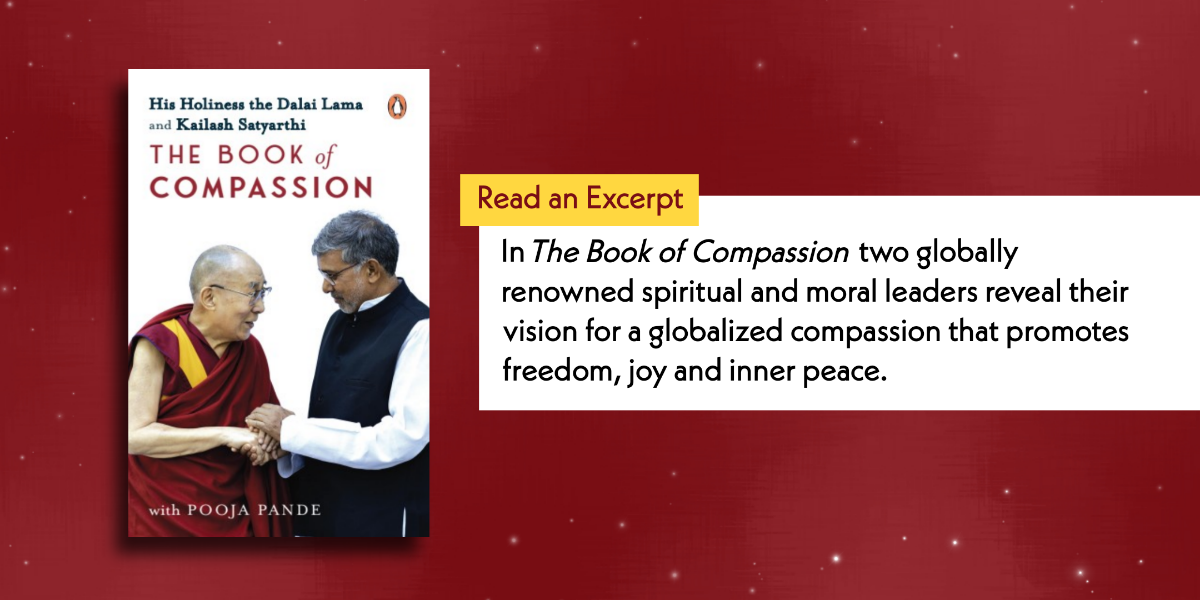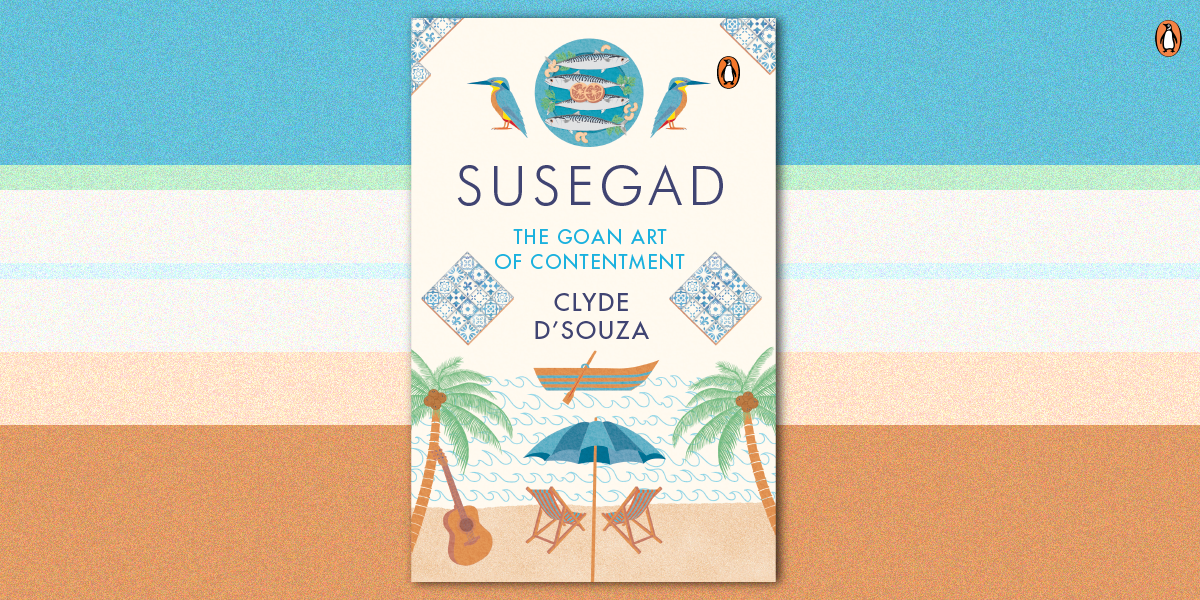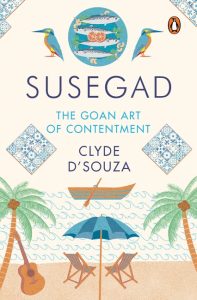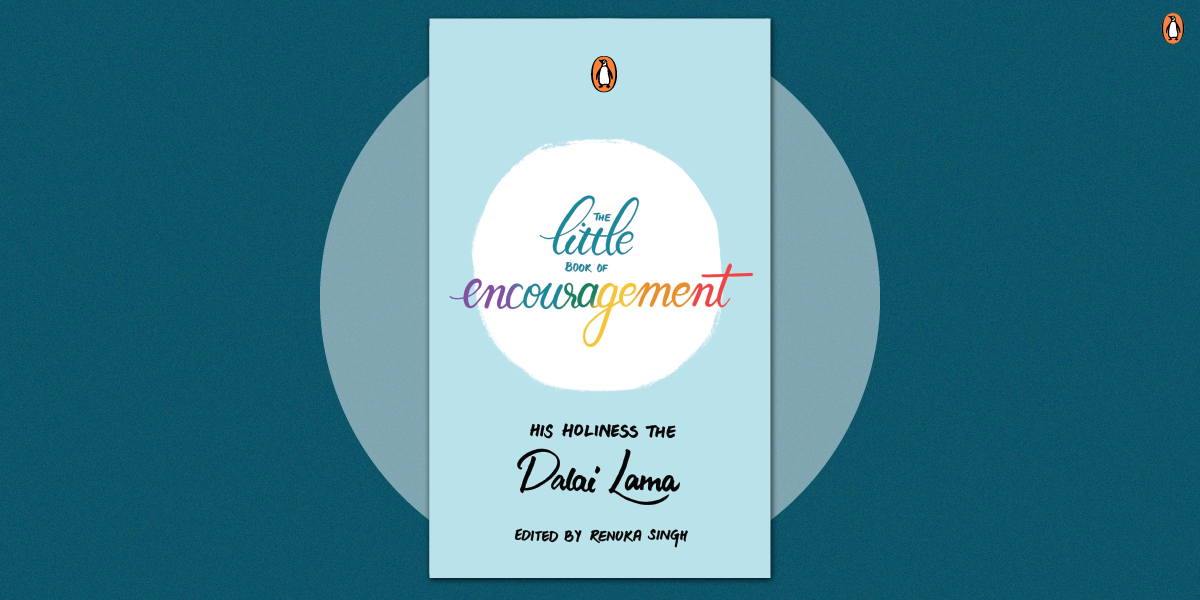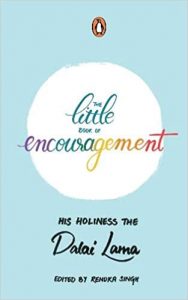In a world full of conflict, The Book of Compassion by Nobel Peace Prize winners His Holiness the Dalai Lama and Kailash Satyarthi offers a message of hope. It shows why compassion is essential, not just as a virtue, but as a key to survival and change in our connected world.
Read this excerpt to find your way towards a kinder, more compassionate way of living.
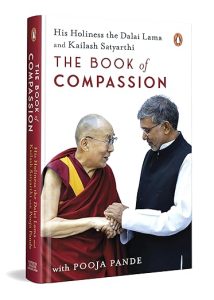
***
Children, Choice and Compassion
His guest, of course, is nothing if not a man of action. ‘These ideas have to be put into practice on the ground’, he says, speaking of how they came to evolve for him, ‘I gave up my career in 1980 and I started finding solutions to the problem of misery and exploitation of children. I realized that the people who are exploiting children are not my enemies. They are sick somewhere, and I have to solve their problem as well. If I am compassionate towards that child, I am equally compassionate towards the exploiter. He just has a different problem. And we have to solve the problem through compassion.’
The Dalai Lama agrees, ‘All these troublemakers come from society only. And society only talks about material values, never (about) inner values.’ He says in an appeal steeped in science, ‘All the destructive emotions are very much based on appearances, and quantum physics also says that nothing exists as it appears. Quantum physics says that physical objects do not have their own absolute nature. Things do not exist as they appear to our perception.
He pauses and adds, ‘. . . effort to reduce negative emotion is very scientific’.
Kailash Satyarthi continues the train of thought: ‘We are all born with compassion. There is a seed, a spark of compassion and that is human instinct, human nature; it is biological. But then the new identities begin. Knowledge is imposed in the name of competition, fear and insecurity and it all gets very magnified.’
His Holiness adds, ‘The (education) system is useful but not complete.’ He speaks more about the missing elements: ‘We human beings have five sensorial consciousnesses, but the dominant force of this sensorial consciousness is mental consciousness. Modern education mainly deals with the sensorial level. It is kindness that brings peace, happiness and calm at the mental level. Mental consciousness is the sixth mind. The “chit” besides the five senses or organs’.
He makes an allusion to the practice of the Buddhist meditation tradition Vipassana and Kailash Satyarthi interjects the mood with some light-heartedness, ‘Please always look at her as she is the Vipassana person’, he says, gesturing at his wife of many years, Sumedha ji, ‘She used to do it and I never did!’
His Holiness seems to continue in a sombre mood: ‘We are facing a lot of problems in the world. Manmade problems’. With the familiar sense of mischief, not one to let the humour in a room fizzle out, he adds, ‘and in some cases, a “lady-made problem”.’ Bellows of laughter echo in response.
Kailash Satyarthi brings up the story of the infant Dalai Lama perched on his mother’s shoulders, directing her movements in tandem with his childhood whimsies, which has His Holiness nodding and smiling, ‘My mother, very kind.’
Talk of childhood nudges Kailash Satyarthi to share a favourite story from the epics: ‘When Sudama knocked at his door, Krishna didn’t tell his guard to attend to it. Krishna himself came down all the way and ran and greeted him. That was respect and love. Similarly, you cannot be a friend of a child until and unless you are ready to come down, as Krishna came down all the way from his throne to the field to hug Sudama. You have to give up your egos and break those barriers. So people like us—me, not us—who have some ego, who have some knowledge and all kinds of ideas and so many complications because of the conditioning of our brain through education . . . we have to try to give that up. If we are friendly to children, then we are friendly to the future. We have to learn to be with the child, respect the child and nurture a tendency to learn from the child—learning purity, learning simplicity.’
His Holiness vehemently agrees, ‘Yes, young children don’t care who is from another religion or other nationality—they play together. If you ask five-year-old children, ‘Do you prefer smiling face or angry face?’, they will say, ‘smiling face!’ So this is just nature. And that is, as the scientists say, that basic human nature
is more compassionate.’
The Dalai Lama too makes the argument against conditioning: ‘Once they join education . . . there is a lack of the oneness of humanity and the value of education only talks of material values. So the basic human nature becomes thinner and thinner. He circles back to the discussions of Day One: ‘A revolutionary education system should be there, and we should not expect (it to come) from some other country, particularly not the United States, too complicated!’
Kailash Satyarthi adds the gory facts: ‘In a number of countries, the number of soldiers is greater than the number of teachers. The number of weapons is greater than the number of books and toys. The number of military camps is greater than the number of schools. So this is the world we have created, Your Holiness, where only four-and-a-half days of global military expenditure ($22 billion) can take care of the education of all children in the world.’ He pauses and repeats, shaking his head, ‘Just four-and-a-half days . . .’
His Holiness offers comfort and hope in return: ‘I think let us concentrate here, in this country.’ He paints a picture of the future that he can already see: ‘After ten years, fifteen years, the world will see—“Oh! India has a unique education system.” And then more and more people will come.’
‘You see,’ he says, smiling back at Kailash Satyarthi and everyone in the room, ‘we are not talking about Nirvana or next life or God . . . but simply (about) how to build a happy family, a happy community and finally, a happy world.
***
Get your copy of The Book of Compassion by His Holiness the Dalai Lama, Kailash Satyarthi, and Pooja Pande on Amazon or wherever books are sold.







